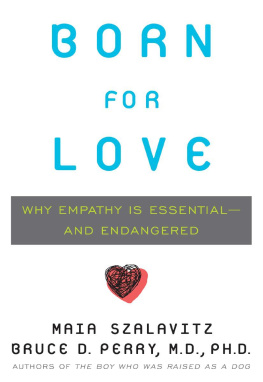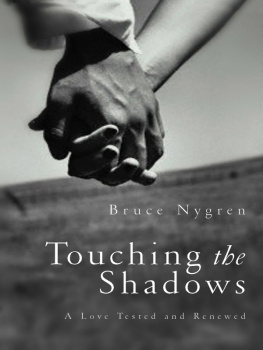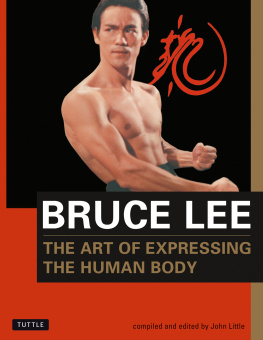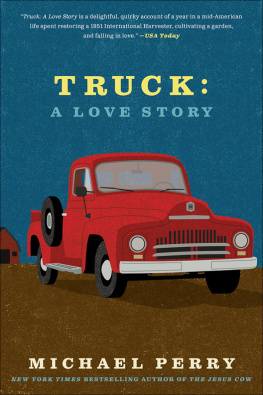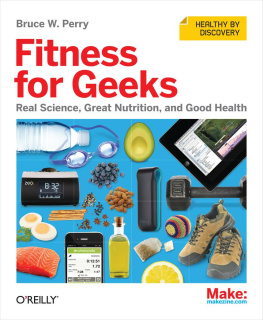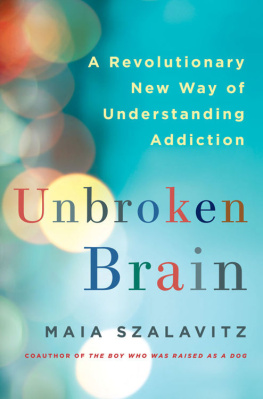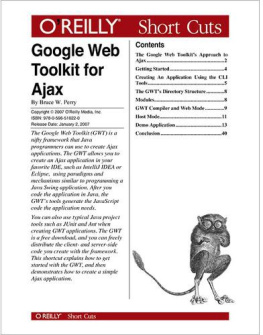Maia Szalavitz and Bruce D. Perry, M.D., Ph.D.
TO AARON, CELESTE, AND ELIANA SMITH:
May your empathy be a guide for others and
may the world grow more empathetic with you!
Maia Szalavitz
FOR MY FATHER, DUNCAN RICHARD PERRY:
Miyotehew .
Bruce D. Perry
We are all born for love. It is the principle of existence, and its only end.
Benjamin Disraeli (18041881),
English statesman and prime minister
A human being is a part of a whole[but] he experiences himself, his thoughts and feelings as something separated from the rest. This delusion is a kind of prison for us, restricting us to our personal desires and to affection for a few persons nearest to us. Our task must be to free ourselves from this prison by widening our circle of compassion to embrace all living creatures and the whole of nature in its beauty.
Albert Einstein
Contents
Heaven Is Other People
In Your Face
Missing People
Intense World
Lies and Consequences
No Mercy
Resilience
The Chameleon
Us Versus Them
Glued to the Tube
On Baboons, British Civil Servants, and the Oscars
Warm as Iceland
All Together Now
People and Programs
There are many ways to collaborate on a book. Sometimesas we did in our previous book, The Boy Who Was Raised as a Dog: And Other Stories from a Child Psychiatrists Notebook it makes sense to write entirely from one authors point of view. That book was based on Bruces cases and traced his intellectual journey as a child psychiatrist through those stories.
For this book, however, we wanted to do something different. Born for Love: Why Empathy Is Essentialand Endangered is an exploration of ideas and stories shared and developed by both of us. That meant we had to write about situations in which one of us was present and the other was not. If we wrote it in Bruces voice only, it would be hard to describe Maias reportingwhile if we wrote in Maias voice, the same problem would occur in Bruces cases.
Consequently, we decided to write as we and describe ourselves in the third person when just one of us was involved. That way, we could accurately detail scenes without eliding who was where and convey individual thoughts and ideas while retaining a consistent voice. We hope that this provides a satisfying narrative solution to the reader.
Wed also like to add a note here about the broad nature of this work. Throughout this book, we attempt to distill and describe some remarkable research from an immense variety of academic disciplines. Empathy is a truly universal topic. As a result, we had to be selective and even to oversimplify in some cases. We hope that our effort to summarize research did not distort the primary findings, key implications, or core principles of the important work of others. If so, we beg the forbearance of our colleagues. We hope that our readerswith whatever disciplinary background they bring to the subjectwill read this book in the spirit in which it is written. We intend it as an exploration, a call for greater awareness, conversation, and broad debate about what we believe is our fundamental interdependence on one another and the crucial role of human relationships in the health of societies. We dont intend it as a final word, merely the beginning of what we hope will be a fruitful and truly transdisciplinary dialogue.
Finally, a note on names: those with asterisks (at first occurrence) are pseudonyms, and some identifying details have been changed to preserve confidentiality. In other cases, we used peoples real first names onlythis was their preference when they shared highly personal information. All other names are unchanged.
S O WHY SHOULD I CARE? Why do people show concern for one another anyway? Are we really born for love? Thats what this book is about: the empathy that allows us to make social connections, and the power of human relationships to both heal and harm.
Theres been a recent explosion of scientific research on the subject, an incredible set of findings that show how empathy and the caring it enables are an essential part of human health. Indeed, one reason you should careas the stories youll read here illustrateis that youll live longer and be happier. But thats only the beginning. Empathy remains both intensely important and widely misunderstood. Its influence on the way we connect to each other can be seen everywhere, from the nursery to the Federal Reserve. And, as technology propels change at increasing speed, understanding the basis of these connections becomes ever more critical.
As we write, were both bombarded by BlackBerry pings, cell-phone melodies, and Facebook notifications. We suspect that something important is changing in the way people relate to one another. We worry that the ability to empathize is in danger, that there might be, as a famous politician put it, an empathy deficit in America.
Bruce has long been astonished by the range of empathetic capacity that he sees in his work as a child psychiatrist. On one end is Ryan,* who we meet in Chapter 6, a young man from an excellent family, headed for a great collegewho raped a developmentally disabled girl and boasted that hed done her a favor. On the other is Trinity, a woman who grew up to help hundreds of children in foster carebut whose early life was marked by abandonment and even murder in her family. Her story is in Chapter 7.
In between are most of us, including people like Eugenia (Chapter 3), who was adopted from a Russian orphanage into a loving familybut found that certain aspects of emotional connection dont come naturally to her. And Sam* and his son, Jonah,* who both have autism spectrum conditions that can cause a different set of problems in human interactions (Chapter 4). Throughout this book well meet folks whose lives illustrate conditions that can enhance or diminish empathyand whose stories can help us understand how this one human capability can link us all across time and cultures, but may also be threatened by very specific situations and experiences. Well also learn about cutting-edge science that is demonstrating ever more precisely how empathy matters to emotional and physical health.
Maia, meanwhile, has long wondered about empathy for more personal reasons. Oversensitive and bullied for being so as a child, she struggled with both an intense desire to connect and extreme personal distress that made her feel selfish when she couldnt. Why does it sometimes feel so hard to maintain friendships and family relationships? What do neuroscientists mean when they say we need one another to maintain the health of our stress systems, when they claim that our bodies are actually interdependent? Can you feel empathetic toward othersbut fail to act that way because their pain overwhelms you?
We both are also concerned about the harsh tone of contemporary American culture: from calls for the legalization of torture to the actual practices uncovered at Abu Ghraib and Guantanamo Bay, and torture porn movies like the Saw series. There are also reality shows like Intervention, Celebrity Rehab, and Brat Camp and relentless attention to celebrity breakdowns like that of Britney Spears, which showcase other peoples pain as entertainment.
Simultaneously, a worrying set of trends shows a measurable decline in social connection in America. For example, 80 percent of Americans say that the only people whom they feel close enough to confide in are family members. A full quarter say that they trust no one at all with their intimate secrets.1 The proportion of people with no close friends or family members tripled between 1985 and 2004. Our trust in one anotheran important factor in all types of relationships, personal and economichas plummeted. Back in 1960, 58 percent of Americans endorsed the idea that most people can be trustedbut by 2008, this number was down to 32 percent (and it was already down to 33 percent by 1998, long before the economic crisis).2

